Your cart is currently empty!
Blog
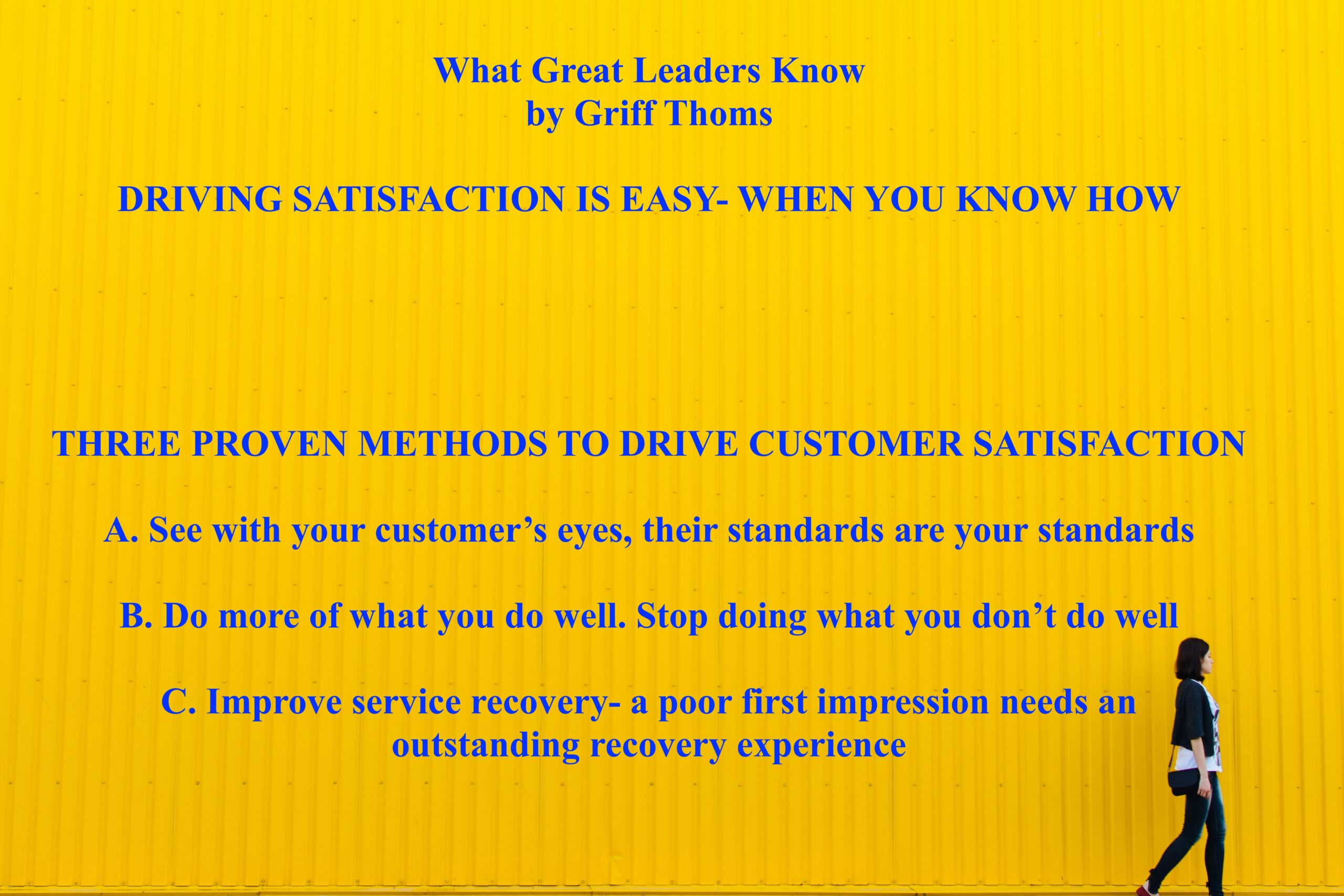
Driving Satisfaction Is Easy
Driving Customer Satisfaction Is Easy With Effective Strategies.
Here’s How
THREE PROVEN METHODS TO DRIVE CUSTOMER SATISFACTION
Throughout my career I have been able to significantly increase customer satisfaction, in my case patient satisfaction. But these methods will work in any customer centric arena.
Examples from my career-
- Savannah, GA
- increased patient satisfaction from the 1st percentile (lowest of the low) my first day, to the 82nd percentile, 18 months later. Despite reducing staff from 198 FTEs to 128!
- Virginia
- grew patient satisfaction from the 15th percentile to the 80th percentile.
- Arlington, Virginia
- improved patient satisfaction from the 12th to the 75th percentile in 8 weeks.
- Georgia
- pushed patient satisfaction up from the 5th to the 65th percentile.
I have never, not dramatically increased customer satisfaction levels as a leader. Here are 3 key methods from me to you.
A. See with the same eyes the customer sees I asked a food service team them about their customer satisfaction scores. They self reported a stellar 95% satisfaction. Service delivery and the quality of the food the food was poor. My observations were backed up by comments from 50 customers. spoke with. I told them they were more like a 10% satisfaction, honest and direct feedback that offended some. I asked, how can you rate yourselves a 95% when your customers think you’re a 10%? You’re never going to improve. Three months later, when patient surveys were used they were rated an 8%.
The goal of our team making customer rounds is not to gather compliments. It is to learn what we can improve. Nobody wants to hear negative feedback, but that’s how we improve. The best internal customer surveyors match customers scores. They understand the expected standard. We must see how the customer sees our performance. Only then, when we embrace of short falls, can we improve.
B. Stop doing this and do more of that. I listen for 2 things when I speak with customers. What did we do well, so we can do it more often. What can we do differently, so we can stop doing what doesn’t work.
C. Improve service recovery. For this example, lets imagine customers have an internal satisfaction scale of 1-5 where 1 is poor, 2 is fair, 3 is moderate, 4 is good and 5 is excellent. When we have disappointed the customer, most businesses understand some type of response is needed. But, most don’t understand WHAT response is needed.
For example, if the restaurant got your order wrong and you think of your experience as a 1 on the scale, what is the appropriate response? My experience is most would say, get them what they ordered, but I would argue that response is a 3 moderate at best. The least I would expect as a customer is to end up with what I wanted. So, we moved the customer perception needle from a 1 to a 3 at best. But we’re not looking for 3’s!
I ask teams I consult with to tell me what a 5 response is. They tell me, give them the right order, say you are sorry and give them a free drink, which is pretty good, like a 4, but it’s still not a 5! So, what does a 5 look like? Get their order right, apologize, give them the meal for free, give them a 25% discount on their next meal. That’s a five!
But some people will say, that’s too much, you’re going to lose money! What better incentive to do things right the first time than to have a painful consequence when things go wrong?
In taking the customer experience from a 1 to a 5, you have given the customer a story to share about your greatness. When they share the story, you will gain more customers. When they come back to save 25%, you are earning 75% more than you would have had if they remained unsatisfied.
Driving Customer Satisfaction Is Easy With Effective Strategies
KEYS TO SUCCESS
- See with your customer’s eyes, their standards are your standards.
- Do more of what you do well. Stop doing what you don’t do well.
- Improve service recovery- a poor first impression needs an outstanding recovery experience.
LINKS
https://whatgreatleadersknow.com
https://centerforappreciativeinquiry.net/resources/what-is-appreciative-inquiry-ai/https://hbr.org/1990/07/the-profitable-art-of-service-recovery
- Savannah, GA

Teams Vs. Committees: Which Boosts Productivity More?
Instead of taking action, do you spend too much time in committee meetings talking about taking action rather than taking it? This article provides insight into Teams VS. Committees: Which Boosts Productivity More?
Great leaders watch their timespend, sticking to a strict diet, low on committee meetings and high on team meetings and taking action.
Committee Meetings are necessary as a part of regular communication. Attending more committee meetings, results in getting less actual work done. Being trapped in the committee square dance, exiting one committee meeting and entering the next, decreases effectiveness. So, Teams Vs. Committees: Which Boosts Productivity More?
A team is not a committee and A committee is not a team.
Committees exist to exist and monitor while teams exist to accomplish, consequently, I advocate for teams to avoid committees. Feeling overcommitteed, I met with every committee leader and explained I supported their committee, but I would only participate on issues directly related to my team. I continued to collaborate and communicate in the normal course of my work but I was committee free!
Ineffective committees can act as the carbohydrates of a business leading to work process sluggishness.
Teams assemble to address a specific issue, focus on movement, progress, results and resolution. Overall, effective teams enjoy a short life span, working together only until the issue is proven solved. Proven solved!
Great Leaders investigate their work area with team members, customers, exploring new technologies, ideating, measuring performance. Staying free of obligatory meetings clog the wheels of progress.
Leaders must prioritize and find the balance between observing operations or attending meetings, Observing operations, understanding customers, improving operations, focuses on the present and future, which teams impact. Committees Traditionally look back. This illustrates Teams Vs. Committees: Which Boosts Productivity More?
Team Vs Committee Approach– Hospital Hand Washing Example
Leapfrog reports only 74% of hospitals met CDC hand washing standards in 2023, an improvement from prior years, however hospital hand washing standards have been in place since the 1980s. Physicians started scrubbing before surgeries to reduce infections in the 1870s. (National Geographic)
Over the past forty years, many hospitals created oversight committees to gather results, measure compliance and recommend steps for improving. Yet hygiene compliance, has remained an issue in many hospitals for over forty years. I am suggesting a different approach.
Creating a team could prove more effective in driving higher compliance, while reducing hospital acquired infections. How? By defining the mission, providing education, maximizing real time observations, recognizing positive performers and addressing non-compliance directly.
Teams reach beyond committees by directly observing and taking actions in real time.
WHAT GREAT LEADERS KNOW
- Maximizing productivity and communication requires a sound strategy.
- Watching their timespend, sticking to a strict diet low on committee meetings and high on team meetings and taking actions.
- Working together only until the issue is proven solved. Effective teams have a short life span.
LINKS
https://whatgretleadersknow.com
https://www.leapfroggroup.org/sites/default/files/Files/leapfrog-HH-report-2024_FINAL.pdf
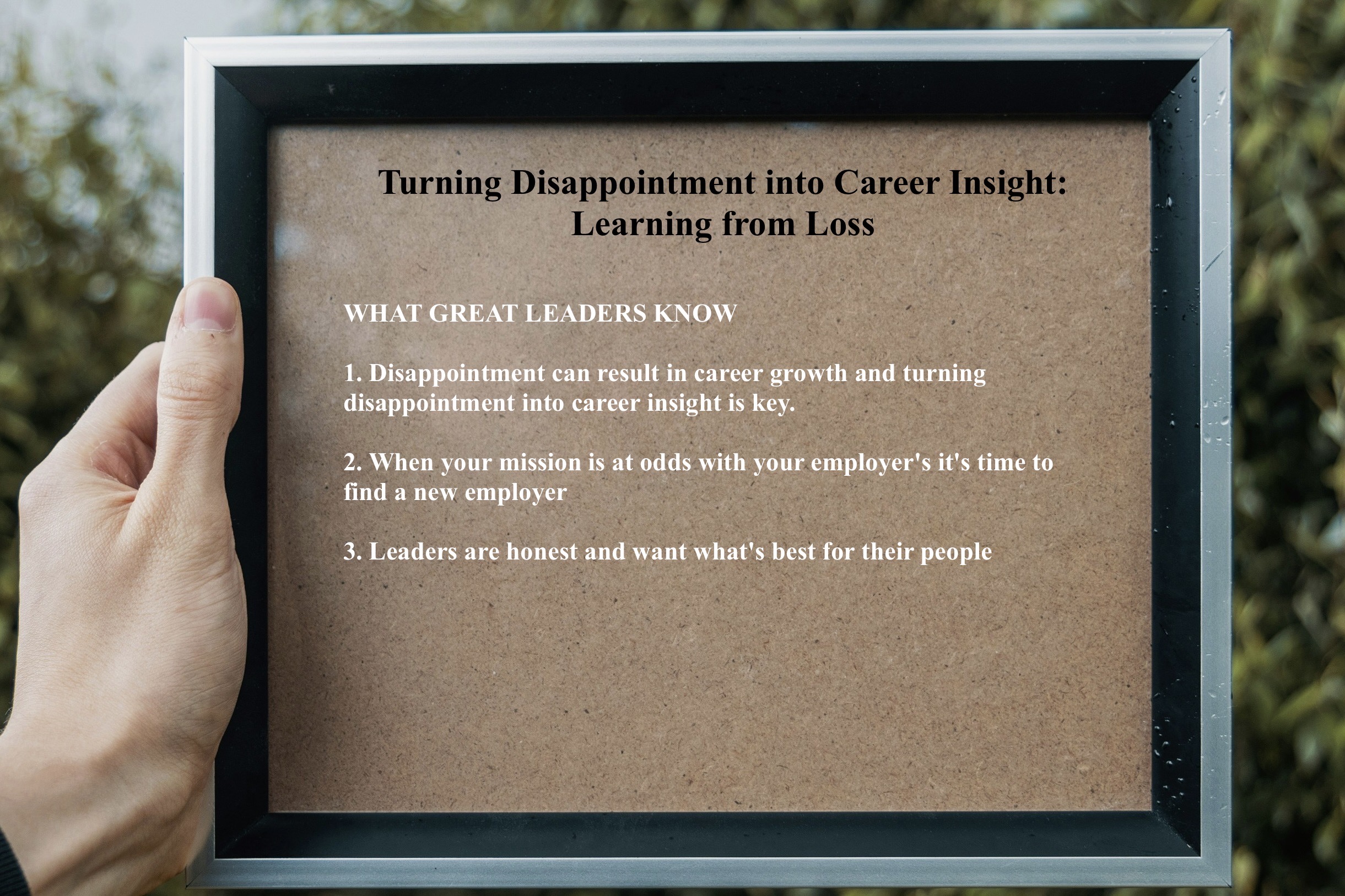
Turning Disappointment into Career Insight: Learning from Loss
Turning a loss into learning
I believe in the axiom Every time a door closes a window opens. Maria in The Sound Of Music is the first place I heard it. There is some discussion about the source.
Early in my career, I applied for a promotion. I had stellar qualifications and my performance put me head and shoulders above other candidates. I even got the first perfect score on the test to evaluate my readiness for the role. As a result, I expected to win the roll. But, I did not. The job went to someone less skilled and qualified. So, I asked to speak with the VP of Human Resources responsible for making the selection and asked what happened.
What she told me made me very angry while setting the stage to turn disappointment into career insight!
You did not get the job because honesty is very important to you.
What?!
I argued that honesty was part of our mission, honesty was a corporate value, honest is what we want our kids to be, we swear an oath when we testify to tell the truth! I made a very compelling argument. She listed attentively and agreed with me, and surprised me by saying unfortunately, that’s not a part of our culture and I think you would find it frustrating to in a role working with people who don’t share you views on honesty being important. You should find an organization that has the same mission and values as you. I did not understand or agree.
Angered by the response, I quickly found the promotion with a competitor. But, the conversation always bothered me, until years later I understood the valuable lesson about turning disappointment into career insight.
If your personal mission and values don’t align with your employer’s, it’s time to find a new employer. Had I received the promotion I deserved, I would have been miserable and faced with fundamental daily conflict. Turning disappointment into insight lead to my career growth. In the long run I benefitted.
She did me a favor by being honest telling me to go elsewhere. She cared about me as a person even though that meant losing me as a good employee.
So, Thanks TK wherever you are!
What Great Leaders Know
- Disappointment can result in career growth and turning disappointment into career insight is key.
- When your mission is at odds with your employer’s it’s time to find a new employer
- Leaders are honest and want what’s best for their people
LINKS
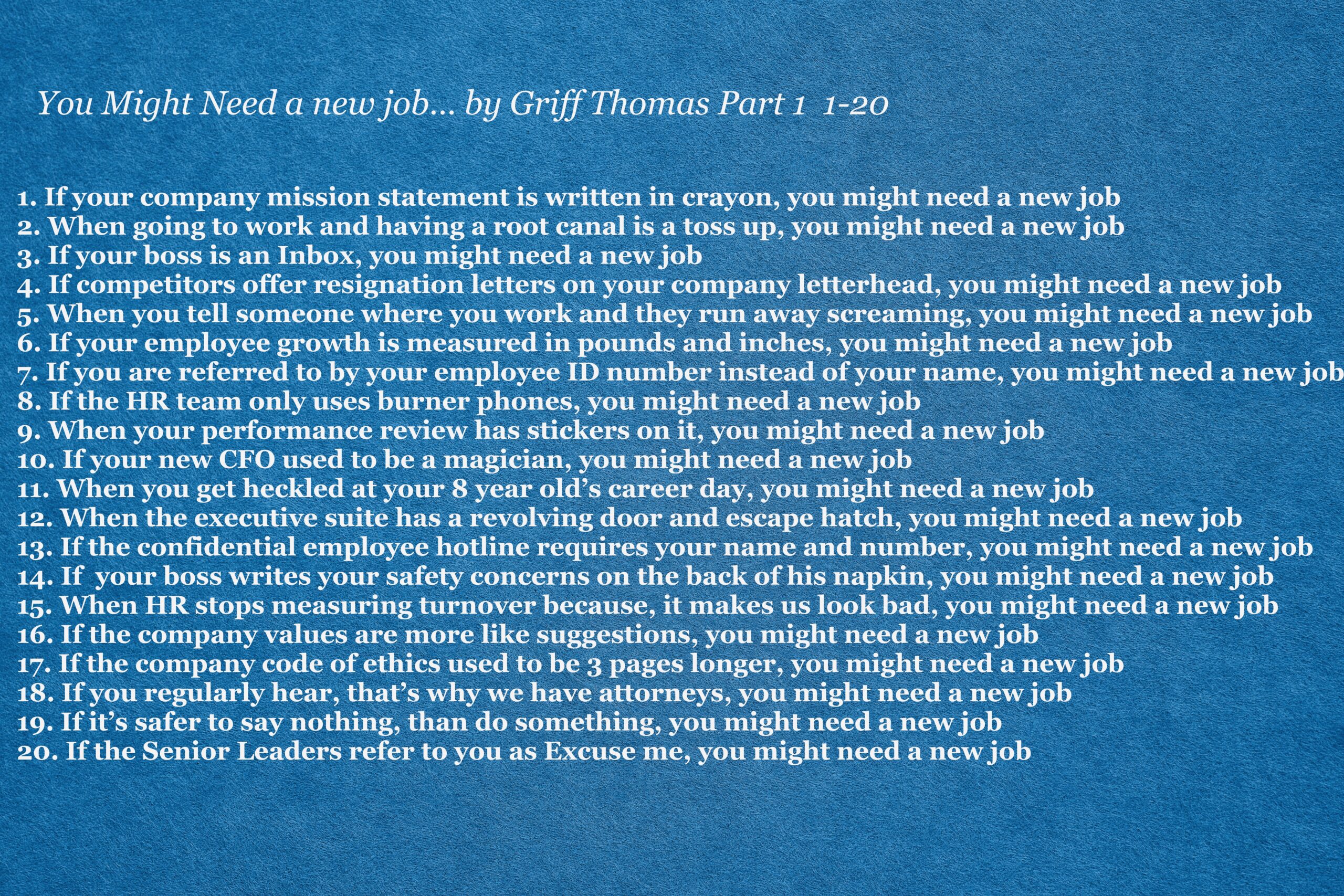
You might need a new job…
20 hilarious ways to know if it’s time for a new job
Part 1 Numbers 1-20
- If your company mission statement is written in crayon, you might need a new job…
- When going to work and having a root canal is a toss up, you might need a new job…
- If your boss is an Inbox, you might need a new job…
- If competitors offer resignation letters on your company letterhead, you might need a new job…
- When you tell someone where you work and they run away screaming, you might need a new job…
- If your employee growth is measured in pounds and inches, you might need a new job…
- If you are referred to by your employee ID number instead of your name, you might need a new job…
- If the HR team only uses burner phones, you might need a new job…
- When your performance review has stickers on it, you might need a new job…
- If your new CFO used to be a magician, you might need a new job…
- When you get heckled at your 8 year old’s career day, you might need a new job…
- When the executive suite has a revolving door and escape hatch, you might need a new job…
- If the confidential employee hotline requires your name and number, you might need a new job…
- If your boss writes your safety concerns on the back of his napkin, you might need a new job…
- When HR stops measuring turnover because, it makes us look bad, you might need a new job…
- If the company values are more like suggestions, you might need a new job…
- If the company code of ethics used to be 3 pages longer, you might need a new job…
- If you regularly hear, that’s why we have attorneys, you might need a new job…
- If it’s safer to say nothing, than do something, you might need a new job…
- If the Senior Leaders refer to you as Excuse me, you might need a new job…
Please subscribe to read the whole series!
LINKS
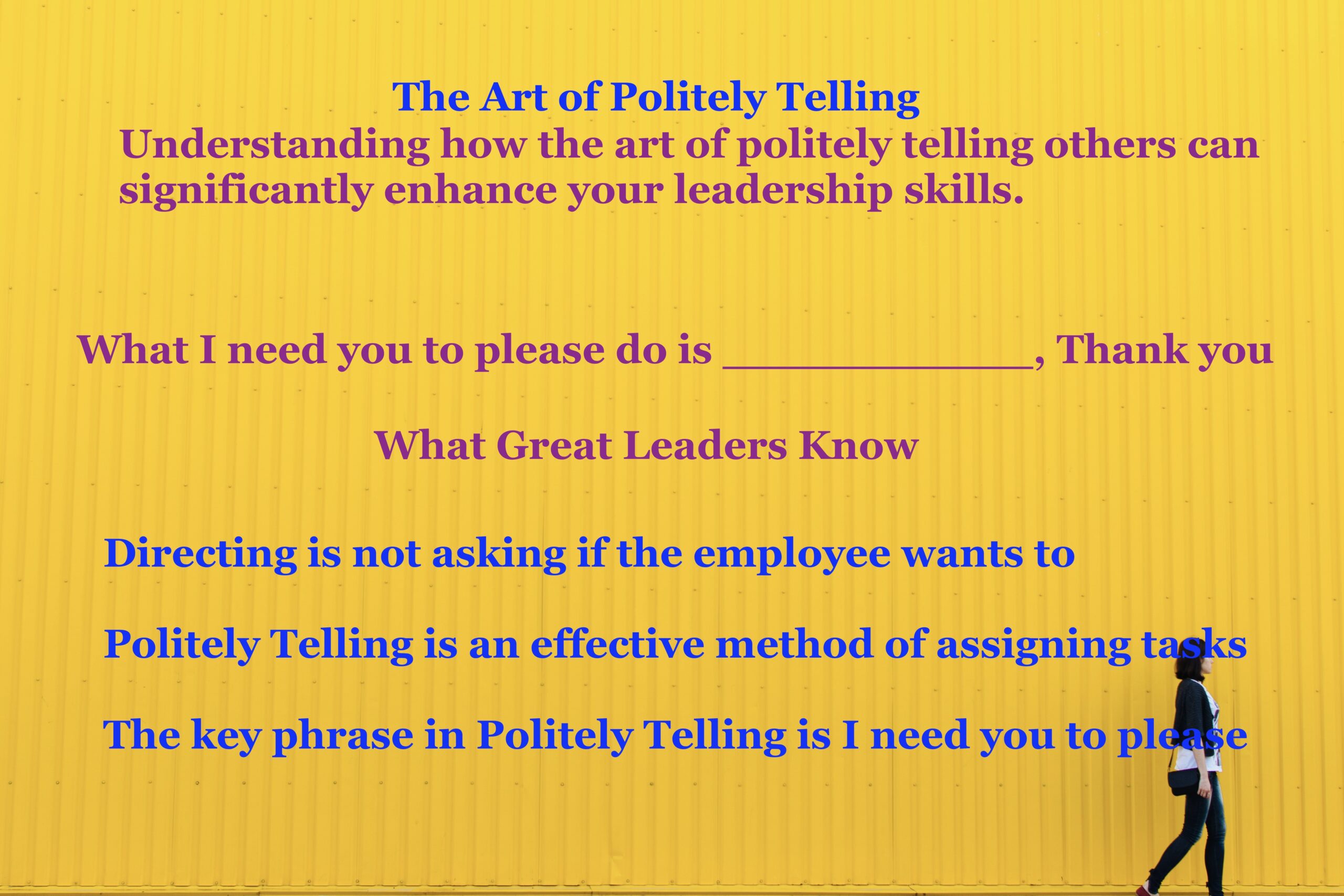
The Art of Politely Telling
Understanding how the art of politely telling others can significantly enhance your leadership skills.
One of the skills I teach new managers is using Polite Directing when giving work assignments. Many new managers ask their team members- Will you do me a favor and take care of this task? Asking gives the mistaken impression there is a choice to comply or not. Politely Directing supercharges leadership messaging and eliminates confusing directions. The Art of Politely Telling is essential for clear communication.
WRONG Asking Will you do this for me?
RIGHT
What I need you to please do is ___________, Thank you This phrase highlights The Art of Politely Telling.
The difference seems small, but delivers an IMMENSE improvement. As the leader, I did not need permission to assign reasonable tasks while I did need to treat my team with respect and dignity. Politely directing finds the common ground between courtesy and direction. Without the polite please and thank you, the directing statement alone is harsh.
The key phrase that signals you are giving a direction is What I need you to please do is ________, Thank you. This method is integral to The Art of Politely Telling.
Other phrases like I would like you to please… or It’s time for you to please… are also effective.
Learning the art of politely directing is a light switch moment for new managers. Transitioning to directing from asking, empowers leaders while their team realizes,: this person is leading me with The Art of Politely Telling.
What Great Leaders Know
The Art of Politely Telling.
Directing is not asking if the employee wants to
Politely Telling is an effective method of assigning tasks
The key phrase in Politely Telling is I need you to please
Links
https://whatgreatleadersknow.com
https://www.businessnewsdaily.com/9186-leadership-language.html
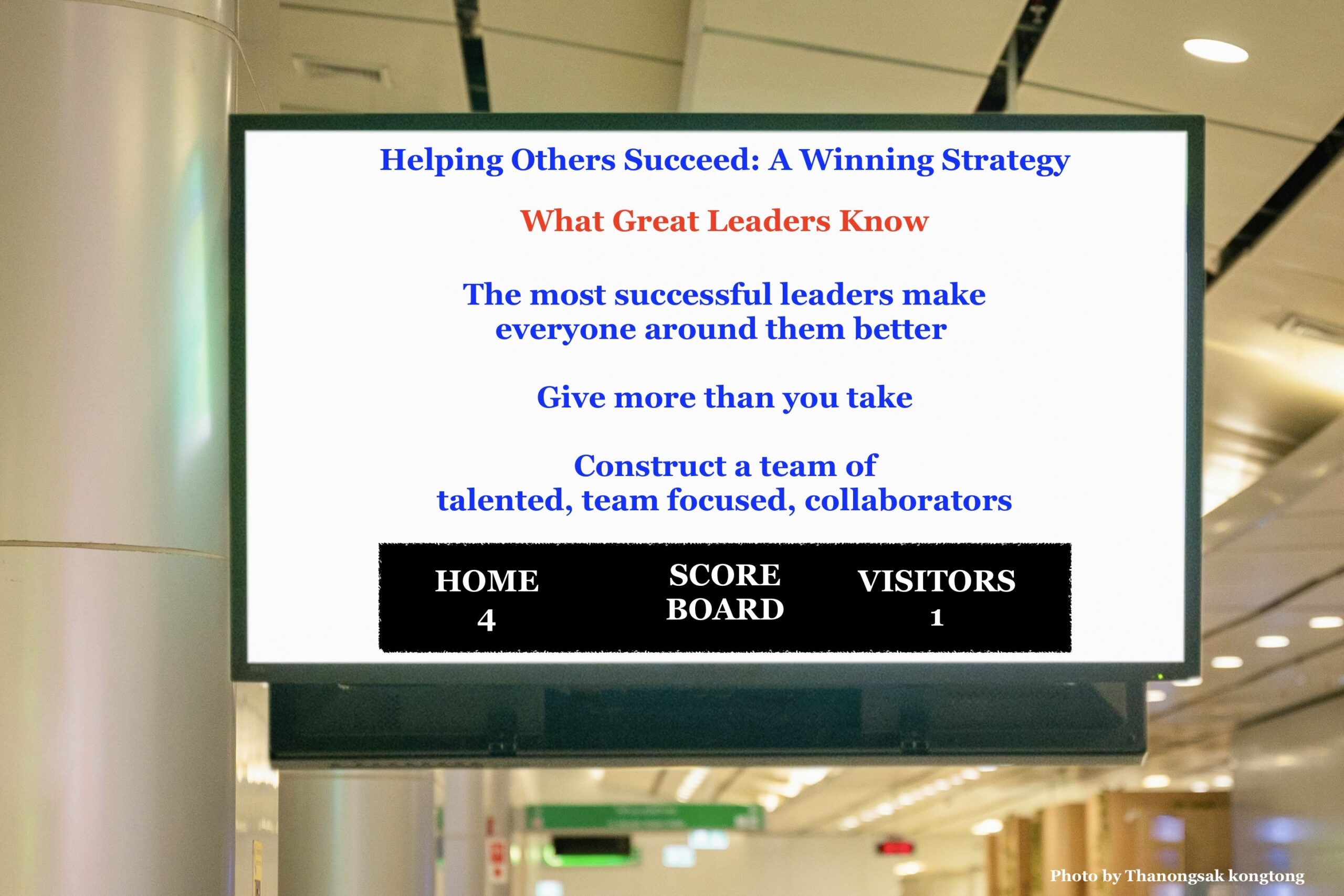
Helping Others Succeed: A Winning Strategy
Developing a winning team is more effective when focusing on helping others succeed: a winning strategy.
When it comes to helping others succeed and generating wins, my friend George Johnson comes to mind. George is a capital G, Great Leader and one of my business heroes. During the time I worked for George he always put my career development first. He assisted me in accomplishing my goals by giving me opportunities to contribute in key situations. He trusted me and always valued my opinion even when it differed. George understood, as exceptional leaders do, that when he helped me succeed, the team won.
Outstanding leaders construct a team of talented, team focused, collaborators. They understand while there is something to be gained from healthy competition, there is more to be gained from working together. One of George’s keys to performance is put points on the board which got me thinking about one of my sports heroes, Wayne Gretzky. The Great One left a measurable legacy of what it means to lead by collaboration. Helping others succeed helps the team win. A lesson from the hockey rink that applies to the workplace, where helping others succeed helps the team win.
Career NHL Goal Scoring Leaders
NHL Hall of Famer Wayne Gretzky, has held the NHL All Time Goal Scoring Record since he retired in 1999 with 894 goals. Washington Capitals Super Star Alex Ovechkin has scored 872 goals and is a good bet to break Gretzky’s record before he retires. Since hockey teams cannot win when they don’t score, nothing is more important than goal scoring. Gretzky played in 1487 games and Ovechkin 1450, their goals per game average is very similar. Helping others succeed, Gretzky enabled his team to win.
What sets Gretzky apart is what he did for other players
Career NHL Assists Leaders
Hall of Famer Ron Francis ranks second in career assists (setting up another player who scores a goal) with an amazing 1,249! Alex Ovechkin ranks 57th with 708 career assists, also an impressive total.
Gretzky assisted another player in scoring a staggering 1,936 times! Nearly 700 more than Francis in about 300 fewer games. Even though he scored the most goals ever, Gretzky helped others score twice as often! This is a prime example of how helping others succeed helps the team win.
Career NHL Points Leader (Goals + Assists)
Nor surprisingly, Wayne Gretzky ranks first in Career Points, either scoring a goal or assisting someone else who scored 2,857 times! Helping others succeed: the winning strategy for team success. Hall of Famer Jaromir Jagr ranks second with 1,921 points, while Alex Ovechkin ranks 12th with 1,580. Even if he never scored a goal in his career, Wayne Gretzky would still be the NHL career points leader!
Gretzky’s teams won 4 Stanley Cup Championships while Ovechkin’s teams won 1.
While Ovechkin will likely end his career as the all time goals leader, Gretzky helped his teammates score 63% more goals than Ovechkin. Helping others succeed: the winning strategy for team success. Most of the time, Gretzky was helping his teammates score. Most of the time, Ovechkin’s teammates were helping him score. That does not mean Alex Ovechkin is not an all time great hockey player. It does not mean he was a selfish player. He was simply better at scoring than helping others score. Wayne Gretzky’s ability to help his teammates succeed resulted in more wins, more championships.
Winning With Your Work Team
Great Leaders who help their team mates succeed, win more often, like George, like Gretzky. In business that means prioritizing your team members career development. Helping others succeed: the winning strategy for team success. Assisting them in accomplishing their goals and giving them opportunities to contribute in key situations. Helping others succeed, in turn, helps the team win.
George understood, as exceptional leaders do, that when he helped me succeed, the team won.
Great Leaders Know
The most successful leaders make everyone around them better
Give more than you take
Outstanding leaders construct a team of talented, team focused, collaborators
Links
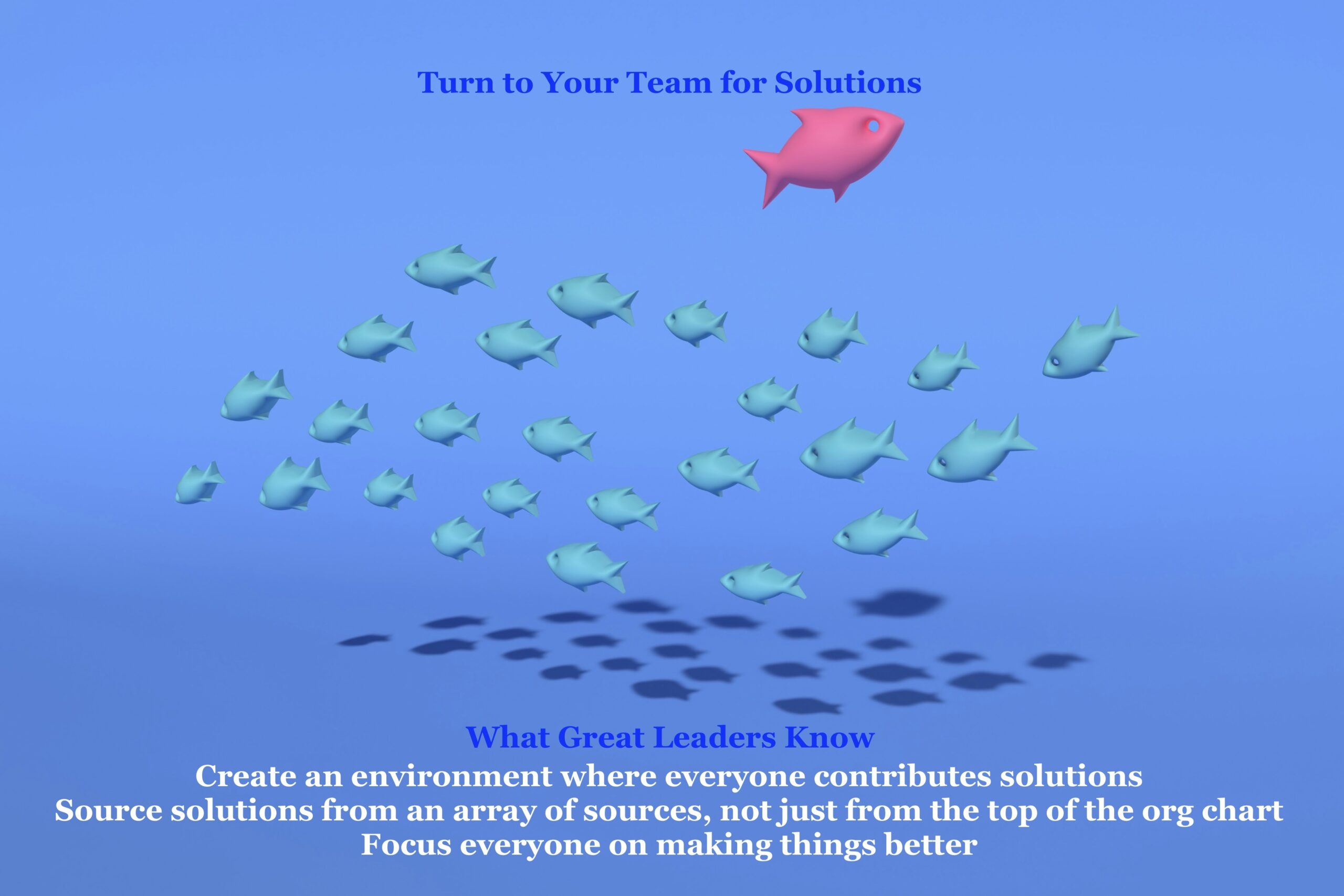
Turn to Your Team for Solutions
Many minds are better than one. Turn to Your Team for Solutions.
Have you ever worked at a job where every decision had to be made by the boss rather than turning to the team for solutions? Asking your team for solutions is a model for growth while single approval control is a misstep. Following the traditional model of business means yielding to the more senior leader as the expert in all circumstances. To be fair, nobody can be an expert at everything or should be expected to be.
Great Leaders know solutions, ideas, innovations come from an array of sources and their role is not to be the one and only solution provider, but the person who creates an environment where everyone has value and is depended upon to contribute to solving problems, innovation, growth.
The obstacle to including team members in decision making is the leader’s need to control. It may seem like the right thing to do is to defer to the boss, but this presents individuals from learning how to make decisions and grow.
When I learned to give problems back to my team, they generated amazing solutions.
Since they were hitting the roadblock day after day, they had a perspective I did not. I made it my goal to engage the team in problem solving. When they would ask me what to do, I asked them what they thought. If they provided a workable solution, I would let them introduce it and give them credit- “We’re going to follow Amy’s plan today.” As you can imagine, Amy’s stock rose among her peers and everyone on the team was motivated to provide the next solution. When other teams spent time gossiping and tuning out, mine were thinking about how can we make things better. Not everyone can offer a workable solution, but that’s not important, engaging them is important.
I remember asking my front line team how we can reduce supply costs. They knew exactly what needed to happen and we reduced supply costs by 20%. They were excited to watch our progress! I was too!
By turning to your team for solutions, employee engagement, retention rates and operational performance results will all improve, leaving the controllers in your wake.
What Great Leaders Know
Create an environment where everyone contributes solutions
Source solutions from an array of sources, not just from the top of the org chart
Focus everyone on making things better
Links
https://whatgreatleadersknow.com/
https://hbr.org/2023/03/how-to-equip-your-team-to-problem-solve-without-you

Team Members Who Love What They Do Excel
Do your team members work for you because they love the work?
Or do they tolerate the work they will never love? This is a seldom investigated subject, but worth shedding some light on.
Great leaders hire people who love their work, team members who love what they do excel in their roles. When candidates say they don’t really want the job you are offering but want to get a foot in the door and transfer or their skills don’t match the skills required, look for other candidates.
You better like the work you do, because you are going to be doing it a lot.
The New England Patriots interview perspective players and try to, above all else, determine if they love football. Team members who love what they do excel. Not just playing in games, but all of the work that goes with it. Pro football is highly competitive and very difficult. Players endure pain, stress, long days, travel, meetings, practice, tryouts, weight lifting, nutrition all before they step on the field. Players who love everything it means to prepare and play are more likely to perform when the going gets tough.
Other players don’t love the work (they may like it) and are willing to put up with the work to enjoy what comes with it- million dollar paychecks, excitement of game day, celebrity and notoriety. For them, the reason to compete is not about the work.
Fill your roster with people for whom work is self-rewarding and they will contribute to high job satisfaction and high levels of performance. Team members who love what they do excel in achieving their goals. Self-rewarded performers still need recognition but as the icing on the cake. The cake, of course, is the work.
What Great Leaders Know
Great leaders hire people who love their work.
You better like the work you do, because you are going to be doing it a lot.
Fill your roster with people for whom work is self-rewarding and they will contribute to high job satisfaction and high levels of performance. Team members who love what they do excel.
I have nothing but deep respect for employees working a job because it is their only option. Doing a job to take care of your life responsibilities even though you do not enjoy it and would choose otherwise, is admirable. There are people who don’t love their work, but show up every day and do it well.
LINKS
https://whatgreatleadersknow.com/
https://hbr.org/2022/04/marcus-buckingham-why-love-is-the-key-to-career-success
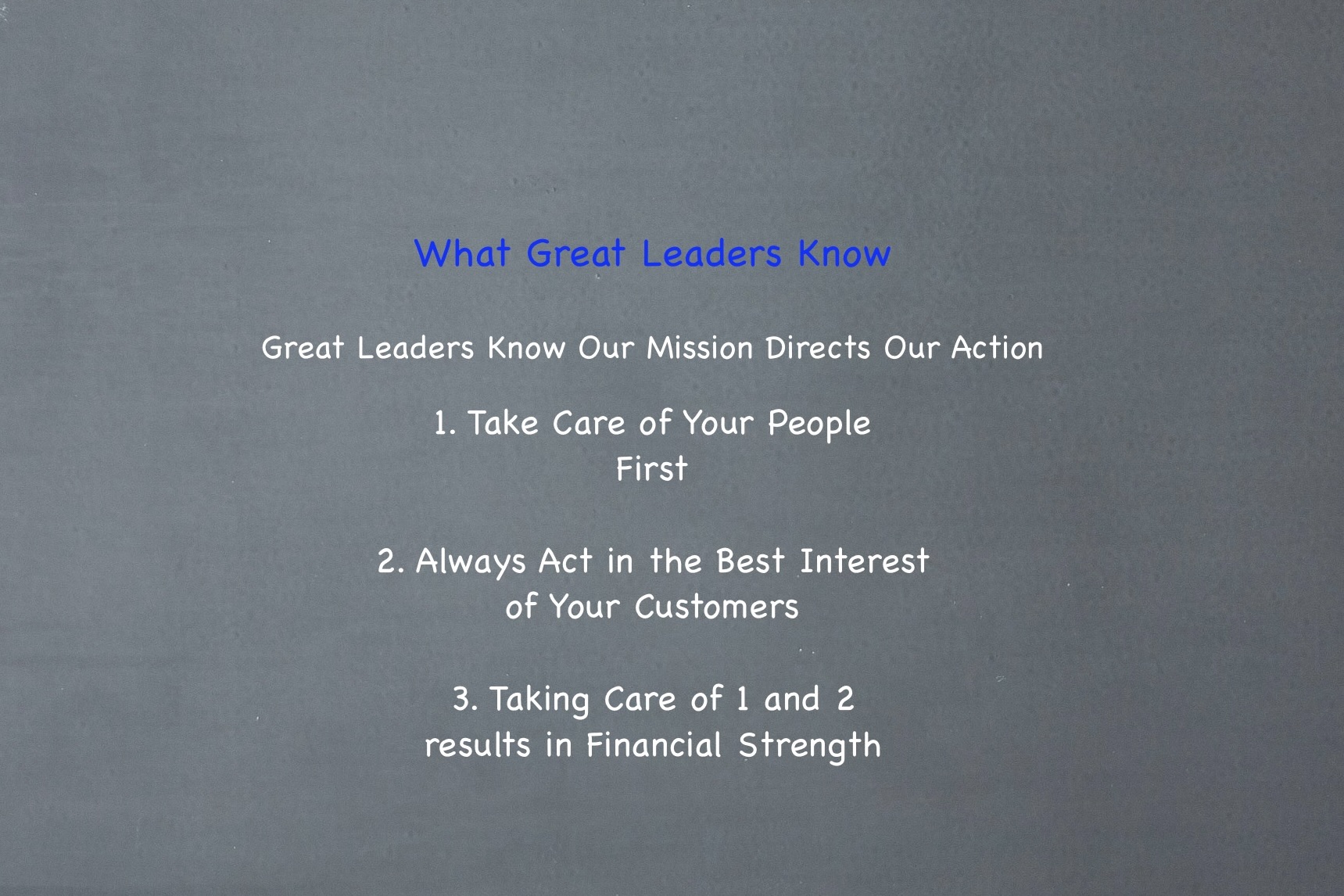
OUR MISSION DIRECTS OUR ACTION
In the first minute of my first class in business school at Westminster College, it became apparent. The professor wrote on the board, the purpose of business is to ______ _____. The rest of the class answered in unison “make money” and received a positive nod from the professor. I said “serve people”, earning me a roomful of skeptical looks.
After class, I approached the professor. “The goal of business is to provide something of value to a consumer. Above all, satisfactory service must happen or the business isn’t going to be paid (or stay paid). Service comes first. ” He stood his ground. Looking back, what I wish I had said was-
Different people have different missions, our missions direct our actions.
Great Leaders recognize their team members as their most important customers. Great service only happens when employees willingly give it because they feel satisfied. As a result, their positive actions toward customers are the manifestation. It’s clear that our mission directs our actions in our professional conduct. Ethical choices are always directed by their impact on people.
I stood alone in my MBA Business Ethics class arguing on behalf of the consumer. My classmates argued for business profits. In one memorable case, a manufacturer refused voluntary recall on cars they knew exploded during collisions because of the additional expense. Yet, my classmates also said they would not buy the exploding car for themselves. If we object to how we are treated as customers, we should not treat our customers the same way!
Mission directing Actions example
In 1982, tainted bottles of Tylenol resulted in several deaths. The poisoning happened after the bottles were on shelves and did not directly involve the manufacturer Johnson and Johnson. J&J spent $20 million to recall their product! Was this the right decision? Yes! J&J’s decision to recall Tylenol, and introduce tamper resistant caplets and containers, set a new standard for product safety, benefitting millions of customers. Tylenol increased their pain reliever market share from 35 to 37%. Today, Tylenol is an industry leader with a 37% market share. History has proven Johnson and Johnson made a wise decision in taking care of customers first.
Great Leaders Know Our Mission Directs Our Action
1. Take care of your people first
2. Always Act in the best interest of your customers
3. Taking care of number 1 and number 2 results in Financial Strength
Links
https://whatgreatleadersknow.com/
https://en.wikipedia.org/wiki/Chicago_Tylenol_murders
https://www.nytimes.com/1999/07/10/us/4.9-billion-jury-verdict-in-gm-fuel-tank-case.html

Great Leaders Know
Mirroring and Compassing
Great leaders know developing their team significantly improves performance. Teaching and learning happen in many ways. Create a culture where growth happens anywhere and everywhere! A two minute elevator conversation can have a profound affect on an open mind. Mirroring and compassing are essential skills to super charge learning.
Great Leaders are a mirror helping team members see what they are doing well and what they need to do differently. They ask questions of their team members rather than providing the answer, acting as “the goalie” catch the idea and pass it back asking clarifying questions and keeping it in play. Jumping in with the solution stifles the creative thinking of the learner, who, when guided comes up with an innovate and new idea! Great leaders know that it is critical to balance guiding questions and solutions.
If you’re trying to navigate to the North Pole, would you prefer a flag marking your final destination or a compass?
Great Leaders are a compass guiding team members by providing feedback to help them reach their goals. The leader’s role is to foster that development. When working with team members, I stay in development mode. I mirror them- this is what I am seeing, this is what I am hearing you say. This approach certainly takes longer than barking out orders, but is the only method that develops a culture of people knowing their opinions matter. Great Leaders understand responsibility for learning belongs to the learner. Great leaders know fostering ownership is key.
When a team member approaches me to complain about another team member, in most cases, I seek to understand and give them advice on how they should approach this problem rather than providing the solution. We discuss approach until I feel confident they can be successful in resolving the issue. I am guiding them on their journey.
Once a boss sat down with me because they had to complete my annual review. They had met with me 3 times the previous year and had little, if any, idea how I had performed. Ten minutes later, including the 2 calls they took, it was over. What a missed opportunity! When I needed a mirror or a compass, I was just another box to check. This motivated me to know how my staff are performing. During performance reviews, there are no surprises because I have been mirroring and compassing throughout the year. Knowing my team helps me be a better leader.
Great Leaders Know
Developing their team significantly improves performance
Being a mirror for both strengths and opportunities at all times helps individuals and the team. Great leaders know this approach builds trust.
By providing ongoing feedback, a leader serves as a compass for their team members.
Great leaders can provide ongoing feedback, serving as a compass for their team members. Knowing when to mirror or guide is essential.
Links